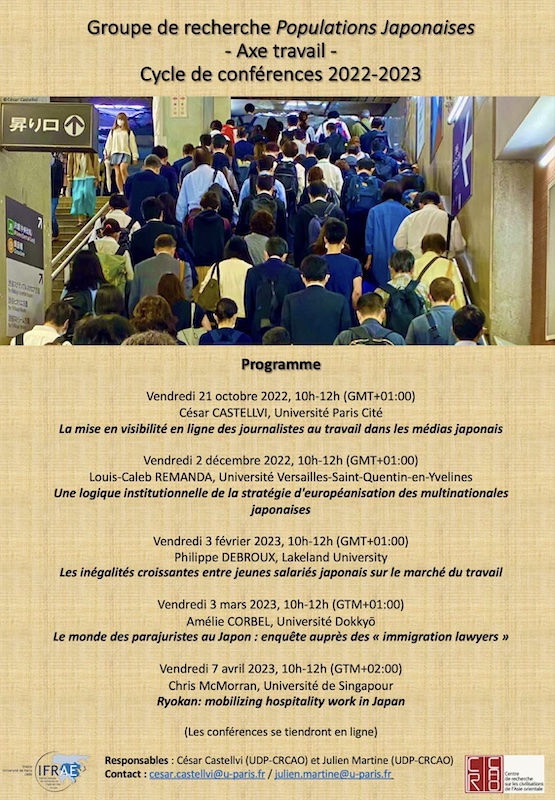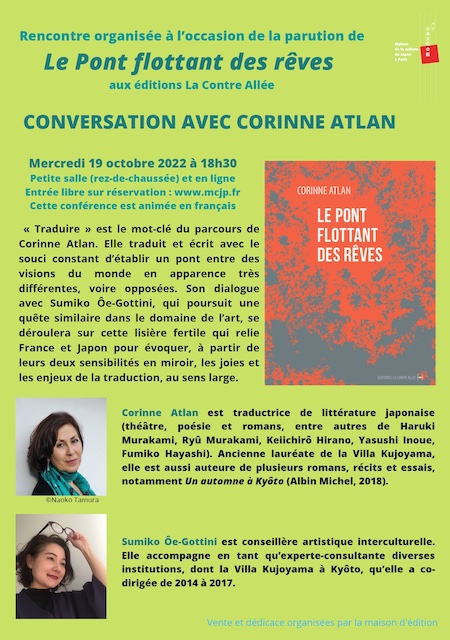Déconstruire l’anthropocène
Mercredi 6 juillet 2022 / 18 h – 20 h (heure japonaise)
Grand débat / En ligne / Avec traduction simultanée
Le grand débat de la Maison franco-japonaise réunira en 2022 deux grandes figures de l’anthropologie française et japonaise, Philippe Descola et Juichi Yamagiwa. Ces deux anthropologues ont pour point commun de s’être interrogés, à travers leurs recherches respectives concernant les sociétés amérindiennes et les gorilles, sur les catégories de nature et culture. Cette interrogation de longue date les rend particulièrement sensible à la question environnementale et plus fondamentalement à l’empreinte que laisse l’homme sur le milieu. Cette empreinte et les transformations qu’elle génère aujourd’hui apparaissent à beaucoup d’une telle ampleur que l’on en a fait une nouvelle époque géologique : l’anthropocène. Au cours du débat, les conférenciers s’appliqueront à déconstruire cette notion largement utilisée dans les médias et la recherche.
Conférenciers : Philippe DESCOLA (Collège de France), YAMAGIWA Juichi (Research Institute for Humanity and Nature, Director-General)Modérateur : MORIYAMA Takumi (univ. de Tokyo)
L’islam et les valeurs politique et sociétales en France et au Japon
Vendredi 08 juillet 2022 / 17 h 30 – 20 h (heure japonaise)
Samedi 09 juillet 2022 / 15 h – 20 h 30 (heure japonaise)
Colloque / En ligne / Avec traduction simultanée
Depuis l’affaire du foulard en 1989, la question de l’islam occupe le devant de la scène en France. Le vivre-ensemble avec les musulmans s’impose comme un enjeu politique et sociétal, et la laïcité, l’un des piliers des valeurs républicaines, apparait à beaucoup comme la clé de la réussite de cette cohabitation. Le sens de la laïcité est aujourd’hui un objet de recherches et de débats qu’il est risqué de schématiser, cependant, sur le terrain politique, on peut cerner une opposition entre ceux qui croient qu’une laïcité accommodante entraîne une islamisation de la France, et d’autres qui pensent qu’une laïcité identitaire marginalise les musulmans et pousse à la radicalisation. Les deux attentats à Paris en 2015, ont largement contribué à polariser le débat autour d’un certain nombre de point de crispation et de menaces. Cependant, la question musulmane ne se réduit ni au voile ni au terrorisme, et les chercheurs s’intéressent aussi à la vie quotidienne de 5 millions des musulmans depuis le marché halal jusqu’à la formation des imams en passant par la genèse d’un islam libéral sur le sol français.
Au Japon, les habitants musulmans sont beaucoup moins nombreux, leur nombre étant estimé à entre 100 et 200 000 personnes, mais l’islam occupe une certaine place dans une société qui devient de plus en plus diverse aux niveaux culturel et religieux. Si l’on peut affirmer que le Japon est lui aussi un pays laïque, dans la mesure où la liberté religieuse et le principe de la séparation entre État et religion sont prônés dans la Constitution, le terme laïcité en tant que tel n’est guère prononcé ni utilisé dans le Japon d’aujourd’hui. Plutôt que d’assoir le respect des minorités religieuses sur une conception universaliste des droits de l’homme, certains Japonais semblent se contenter de dire que le paysage religieux polythéiste du Japon est naturellement plus tolérant et mieux placé que les pays de tradition monothéiste pour réaliser la diversité religieuse. Il est néanmoins indéniable qu’il existe bel et bien une xénophobie à la japonaise, sinon une islamophobie explicite.
Qui sont les musulmans en France et au Japon et quelle place occupent-ils dans chacune de ces sociétés ? Quel regard est porté sur eux et quelle histoire nourrit ce regard ? En face de la question musulmane, sommes-nous dans deux contextes tellement différents qu’il est plus raisonnable de renoncer à comparer l’incomparable ? Ou bien partageons-nous des enjeux communs qu’une perspective comparative serait à même de faire apparaitre ? Quelle sont les politiques suivies par les gouvernements des deux pays ? Et surtout quelles solutions les citoyens de ces deux pays imaginent-ils pour réussir le vivre-ensemble entre les musulmans et le reste de la population ? Ce sont là les questions que nous voudrions aborder dans ce colloque franco-japonais.
Conférenciers : ADACHI Satoshi (univ. Kwansei gakuin), Rachid BENZINE (Sophiapol-univ. Paris Nanterre), Florence BERGEAUD-BLACKLER (CNRS), FUJIWARA Satoko (univ. de Tokyo), HIGUCHI Naoto (univ. Waseda), KOMURA Akiko (univ. Rikkyō), Catherine MAYEUR-JAOUEN (Sorbonne Univ.), MIHARA Reiko (univ. Dōshisha), TANADA Hirofumi (prof. émérite de l’univ. Wadeda), Olivier ROY (European University Institute), Jean-Jacques THIBON (Inalco), Valentine ZUBER (EPHE)
Modérateurs : DATE Kiyonobu (univ. de Tokyo), MASUDA Kazuo (prof. émérite de l’univ. de Tokyo)
Les matériaux de construction :
Des ressources indispensables aux régimes politiques
Mercredi 13 juillet 2022 / 18 h – 20 h (heure japonaise)
Conférence / En ligne / Avec traduction simultanée
Cette deuxième séance du séminaire « enjeux politiques des matériaux de construction » cherche à discuter l’hypothèse selon laquelle les matériaux ne participent pas seulement à la construction du bâti, mais aussi des régimes politiques eux-mêmes. En ce sens, les matériaux seraient à la fois l’alpha et l’omega des régimes politiques et des systèmes territoriaux qui les produisent autant qu’ils en sont les produits. La séance s’intéresse en particulier d’une part à la renaissance du concept d’État constructeur (doken kokka) au Japon depuis la triple catastrophe de mars 2011, et d’autre part aux implications géopolitiques des matériaux en Asie de l’Est.
Conférenciers : Rémi SCOCCIMARRO (univ. de Toulouse Jean Jaurès), Julien GUINAND (artiste photographe indépendant), KITAGAWA Daijirō (Agence des affaires culturelles)
Modérateur : Raphaël LANGUILLON (IFRJ-MFJ)
Pour obtenir les liens d’inscriptions, vous pouvez consulter le site Internet de la MFJ : https://www.mfj.gr.jp/index.php







